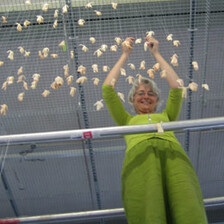The Electronic Intifada 29 April 2025
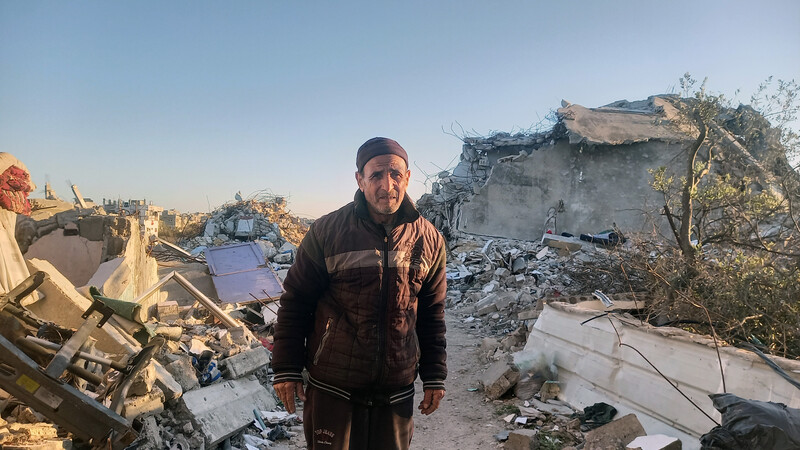
Abu Bassam in his destroyed neighborhood in Beit Lahiya.
Ibrahim Abu Saada – better known as Abu Bassam – believes it was God’s will that allowed him, his wife and sister, widowed daughter and young grandson to survive Israel’s siege on northern Gaza beginning in October last year.
“A man in his 70s like me managing to support his family alone for more than 100 days, surviving a suffocating siege and imminent death – it is truly a miracle,” he told The Electronic Intifada in a February interview during which he detailed his ordeal.
Those long and lonely months may have been the worst for Abu Bassam and his family. But they are not where their story really begins.
Now aged 75, Abu Bassam worked as a truck driver for a ready-mix concrete company before driving a taxi, which he did until retiring in 2010 at the age of 60, when two of his six sons, Muhammad and Midhat, took over the business.
The family was forced to leave their home in the first days of the Israeli genocide in October 2023, seeking refuge in Gaza City – initially at a Doctors Without Borders facility near Al-Shifa Hospital before they moved to an area near Al Ahli Arab Hospital.
The fighting soon intensified and a nearby home was bombed, prompting Abu Bassam’s sons to evacuate to the south. Abu Bassam, his wife, his sister and his daughter refused to leave Gaza’s north.
They stayed at the Doctors Without Borders facility for a few weeks until tanks rolled into the area on 15 November 2023.
Muhammad had parked the taxi he shared with Midhat near the hospital, thinking it would be a safe place. The vehicle was destroyed by the raiding Israeli occupation forces, depriving Abu Bassam’s sons of their main source of income.
A temporary truce pausing Israel’s attacks in Gaza was declared about a week later, allowing the family to move to a relative’s home near the Jabaliya refugee camp, also in Gaza’s north.
Given that their home was in an open area that had been rendered a combat zone with Israeli ground forces still present, it was too dangerous for civilians such as Abu Bassam and his family to go back to Beit Lahiya. There they might have risked being attacked by drones, quadcopters or snipers.
After the truce collapsed, the family was forced to evacuate to a relative’s home in the Tal al-Zaatar area, where they stayed until occupation tanks invaded on 10 December 2023 and Israeli troops stormed the building where they were living.
The Israeli forces used heavy machinery to create an opening in the back of a wall. Soldiers infiltrated the building through the hole and went to the upper floors while Abu Bassam and his family, along with about a dozen relatives of the homeowner who were also sheltering at the dwelling, hid under the stairs.
“There were children with us, and it is a miracle that they did not make any noise that could have exposed us while we were hiding,” Abu Bassam said.
The soldiers set the upper floors on fire before retreating through the same hole about an hour after they entered without noticing Abu Bassam and the others.
During this period of their displacement, Abu Bassam and his family lived off of canned food that they had stocked up on. The displaced people living at the Tal al-Zaatar home had two tanks containing around 2,000 liters of water.
Israeli ground troops withdrew from several areas in northern Gaza in February 2024, allowing Abu Bassam and his family to return to their home in Beit Lahiya in late March.
For Abu Bassam, returning home was to return to serenity.
“Home means stability,” he said, as well as a clean and private bathroom and a comfortable bed. “It is your personal space where you find peace.”
Abu Bassam recalled his routine of watering plants each morning and making hot tea with mint leaves picked from his garden – small pleasures from which he was deprived during his forced displacement.
“Nothing is more beautiful, more tender than returning home after a long absence,” Abu Bassam said. “Nothing compares to the blessing of stability.”
But the return also came with the shocking discovery that his home and everything else in the neighborhood had been demolished or burned.
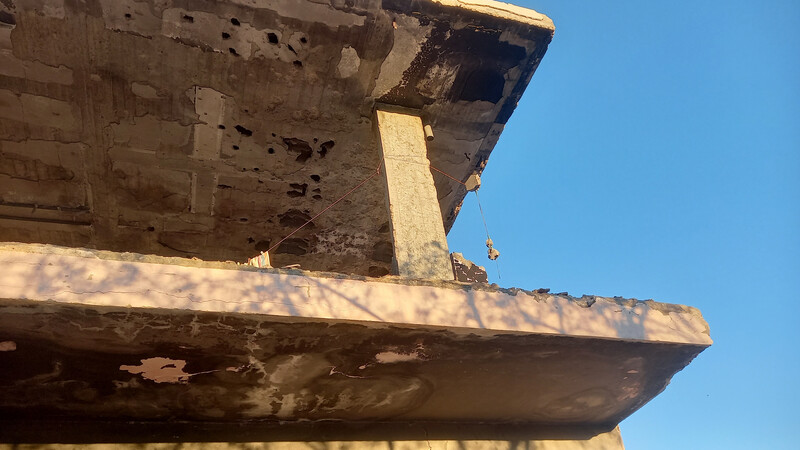
The family repaired what they could in their home and decided to stay along with the remaining residents of the north who had not heeded Israel’s orders to evacuate to the south or else risk being killed.
The second ground offensive on northern Gaza began in mid-May 2024, focusing on Jabaliya camp – the largest refugee camp in Gaza that was established to house Palestinians displaced from their lands during the 1948 Nakba.
Israeli warplanes targeted Jabaliya during the ground invasion. Dozens of Palestinians were killed “in horrifying massacres,” the rights group Al-Haq stated on 14 May.
Beit Lahiya, where Abu Bassam and his family were living, was safe by comparison, and many people from Jabaliya fled to Beit Lahiya and its surroundings.
This invasion of Jabaliya lasted 20 days before the occupation forces withdrew again, leaving the camp in ruins.
The third and most severe ground offensive began nearly five months later.
“What would happen to us?”
On 5 October 2024, the Israeli occupation launched a ground assault targeting northern Gaza without warning – not that a warning would have legitimized the attack.
“Why is it acceptable and justified to the world for the occupation forces to do whatever pleases them against the people of Gaza – killing, destruction and displacement – under the pretext that they had warned them in advance? Where is justice?” Abu Bassam asked.
Despite the risk and the uncertainty of what was to come, he was determined to stay at the family’s home in Beit Lahiya and stick things out.
“Honestly, we were exhausted from constantly being displaced,” he explained. “We can’t walk long distances or bear the burden of moving from one place to another.”
Abu Bassam initially believed that this attack would be like the previous ones – limited ground operations soon followed by a withdrawal. Instead, the ground offensive lasted for three and a half months.
“We went through extremely difficult days and weeks,” Abu Bassam said. “Bombardment surrounded us from all directions. All our neighbors had evacuated to Gaza City, except for us.”
“We witnessed homes being blown up, burned and destroyed, as well as farmland around us being bulldozed,” he added.
“We were in a state of extreme fear, uncertain of our fate. When would they reach our home? And if [the Israeli forces] did, what would happen to us?”
The family had more than one close brush with death during the siege.
“One of the hardest moments for me personally was on 22 October 2024, when my only son was injured in the chest,” Itidal, Abu Bassam’s daughter, recalled in February.
At the time, she was grieving the death of her husband in an airstrike in Jabaliya refugee camp almost a year earlier, leaving her to raise her 10-year-old son without his father.
“Ibrahim was the one who helped me endure the bitterness of life,” she said of her son.
After he was wounded by shrapnel following an Israeli missile attack, Itidal said, “I completely broke down and lost control. But, by the grace of God, the injury was minor, and my father managed to stop the bleeding and treat the wound.”
Taking Ibrahim to a hospital or calling for an ambulance was out of the question. They were forced to treat him with the limited supplies they had, using only rubbing alcohol and cloth to clean and dress the wound.
“Another chance at life”
At first, the family – Abu Bassam, his 72-year-old wife Suad, 82-year-old sister Fatima, Itidal and Ibrahim – were living in three rooms and sharing a bathroom on the first floor of the burned-out home.
About a month after Ibrahim was injured, Abu Bassam was preparing for dawn prayers in the room where he usually led the family in worship.
His wife and sister advised him not to hold prayers there because the room faced the street and was therefore more exposed to danger. Abu Bassam heeded their advice and moved to an inner room to pray.
Moments later, a missile struck the neighboring house, destroying the room where he had intended to pray and an adjacent room.
“We were granted another chance at life,” Suad said. “If we had prayed in that room, we would have been among the dead. But it seems our time had not yet come.”
Days passed monotonously as the family of five living in one room anxiously awaited their fate, telling themselves that the Israelis would withdraw that day or the next. The ordeal dragged on far longer than they expected.
Providing for his family’s basic needs put a lot of pressure on Abu Bassam.
Before the siege began in October 2024, a water supply project had been established that allowed residents to obtain water from a newly dug well that was pumped using solar power. Large hoses were used to fill water barrels on the rooftops of homes once a week, with families paying a symbolic fee of five shekels – around a dollar – per 1,000 liters of water.
The project was a lifeline for people amid the destruction of water infrastructure and municipal water wells throughout Gaza.
Fortunately for Abu Bassam and his family members, neighbors had refilled their tanks just one day before the ground invasion began.
The water in the tank at Abu Bassam’s house lasted 45 days. After that, he climbed over the wall on the left side of his home to access his neighbor Abu Raed’s evacuated house. He connected a hose to its water tank and pulled it through a window into his own home, filling two small barrels – each with a 250-liter capacity – of filtered drinking water.
After that, Abu Bassam went to the house on the right of his family’s home, which belonged to Abu Saadi, who had also fled Beit Lahiya. Abu Bassam connected another hose to Abu Saadi’s two large tanks and used that water for washing, bathing and cleaning.
“I would fetch water at night because I believed the darkness provided better cover, making movement safer than during the day,” Abu Bassam said. “The surveillance drones never left the sky during daylight hours.”
The water he collected from his immediate neighbors’ homes lasted for just more than two weeks.
“A matter of life or death”
Once the water from Abu Saadi’s house was depleted, Abu Bassam stealthily made his way to his neighbor Abu Fahd’s house, around 15 meters away from his home, at night. There, he found a full 500-liter water tank.
“My joy was indescribable every time I found water,” Abu Bassam said. “I had to keep taking risks because, for me, it had become a matter of life or death.”
“I would rather die from a missile while trying to fetch water and food than watch my family die before my eyes from hunger and thirst,” he said.
Food was less of a concern, as Abu Bassam had stocked up on canned goods from aid distributions; getting enough water remained his family’s primary struggle.
“Many of our neighbors called me, telling me to go to their homes and take whatever food and water I could find if I had the chance,” Abu Bassam said. “They checked on us repeatedly.”
Fearing that the Israeli military might discover the family’s presence by detecting a phone signal, Abu Bassam kept his phone off most of the time, turning it on only briefly in the early morning to read, reply to text messages or receive phone calls.
When his water supply ran out yet again in mid-December, Abu Bassam went to neighbor Abu Mahmoud’s home and discovered a small basin, around two meters long and a meter and a half wide and tall, filled with water. He connected a hose to it and extended it to his home.
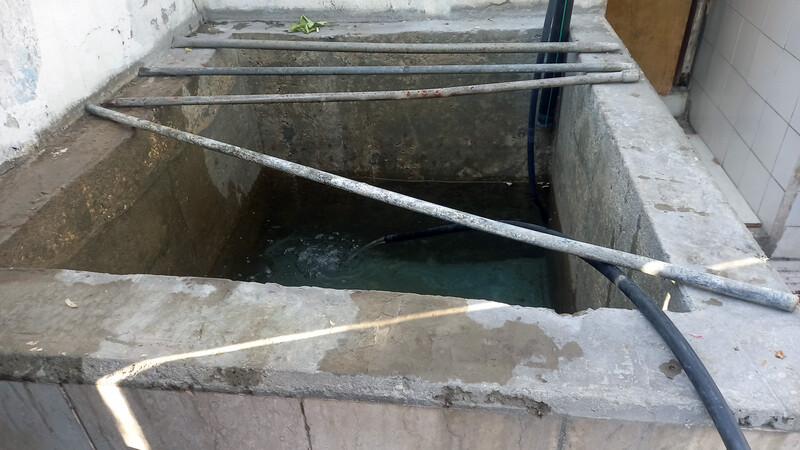
The basin at Abu Mahmoud’s home.
Abu Bassam also found two small barrels of drinking water at Abu Mahmoud’s house but took only one, leaving the rest in case his house was destroyed and the family had to relocate there.
About 15 days later, toward the end of December, the water from Abu Mahmoud’s house ran out.
Desperate, Abu Bassam took another risk – this time in broad daylight – and ventured to a neighbor’s house about 70 meters away.
It was extremely dangerous to climb onto a rooftop in the middle of the day to check for water in the tanks. But by then, Abu Bassam’s family had only four liters of drinking water left.
What Abu Bassam found was devastating: The tanks were completely empty, containing not even a single drop of water.
He was at a loss for what to do, having exhausted every possible means of obtaining water. There were no more houses he could easily reach.
One day after the family ran out of water, as the sun was setting, the sky began to fill with heavy clouds – a sign of hope. Late that night, a heavy rain finally began to fall.
“It was as if God himself had promised not to leave us thirsty,” Abu Bassam recalled.
After performing dawn prayers, Abu Bassam climbed to the top of his house, where rainwater had collected in a dip in the uneven roof. He repeatedly filled a container with rainwater and carried it downstairs to pour into a water tank.
Climbing the stairs of the three-story home over and over again was an exhausting task for a man in his seventies. The extreme danger of being on the rooftop, where Abu Bassam was potentially exposed to the Israeli military, made it all the more perilous.
Despite the difficulty, Abu Bassam managed to fill their 500-liter barrel on the rooftop and their 1,000-liter tank downstairs, securing 1,500 liters of rainwater in total.
To ensure that no more rainwater was wasted and to save himself from undergoing such an ordeal in the future Abu Bassam crafted a gutter system that drained water from the roof directly into the barrel below.
“Constantly on edge”
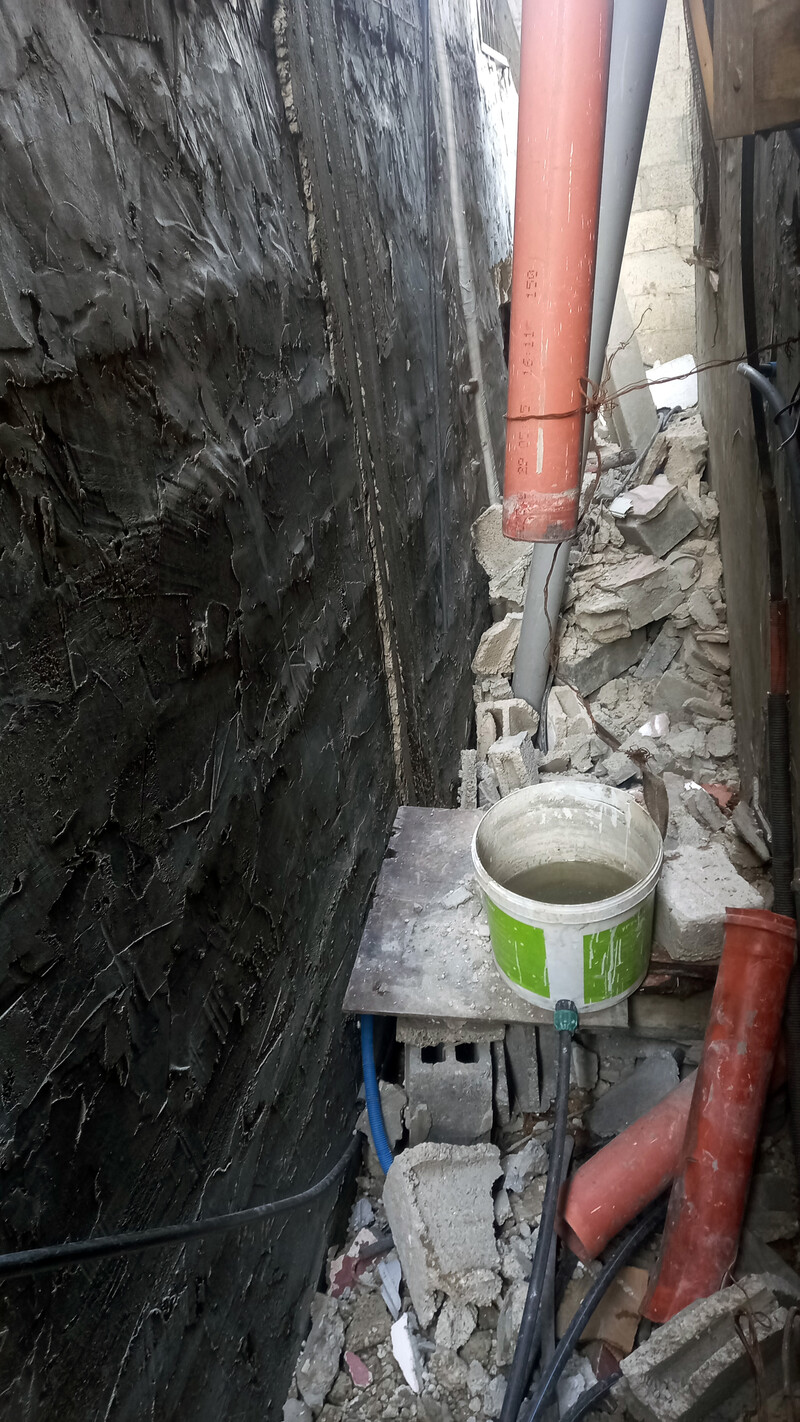
The gutter system devised by Abu Bassam.
Abu Bassam had a single solar panel on the roof, which the family used to charge their mobile phones, a laptop and a radio. They would listen to the news every morning and evening to stay informed about the situation around them. Other than the radio broadcasts, they were completely isolated.
Hour by hour, day by day, the family anxiously awaited any news of a potential ceasefire.
They couldn’t turn on any lights for fear of being observed by the Israeli soldiers and spent their nights in complete darkness.They crawled between rooms to avoid being hit by stray bullets or shrapnel.
Abu Bassam had covered all the windows with thick curtains as a precaution. To cook food, they lit fires in a concealed indoor area to prevent their presence from being revealed.
Ibrahim, Abu Bassam’s grandson, recalled the tedium that prevailed amid the extreme danger.
“Most of the time, we stayed in one room, barely moving except by crawling,” he said.
“Besides the constant fear and terror, I was also extremely bored. There were no other kids, no space to play and nothing to eat except canned beans.“
Itidal said that whenever Ibrahim got scared, “he would hug me and cry. I tried my best to distract him from the terrifying sounds of bombings and explosions by letting him play video games on the laptop.”
Abu Bassam’s son Rafiq, who was in Deir al-Balah with his wife and children during the siege, said that he and his siblings repeatedly tried to appeal to the International Committee of the Red Cross to rescue their family members in Beit Lahiya.
“But each time, they responded that the Israeli occupation refused to allow their evacuation, claiming the area was a dangerous combat zone,” Rafiq told The Electronic Intifada in early March.
Abu Bassam’s son Muhammad said that he and his siblings “were constantly on edge, waiting for messages from our father to reassure us that they were still alive.”
“At the same time, we were terrified that our calls and messages could lead to their deliberate targeting,” Muhammad added. “Every morning, my father would send a short text saying they were okay, then turn off his phone for the rest of the day to prevent the occupation from tracking their signal.”
“No one will ever know our fate”
Abu Bassam’s greatest fear was that Israeli troops would reach the house and demolish it on top of them. Abu Bassam and his family thought many times about leaving the house and surrendering to the army. But each time they reconsidered due to the real risk that they might be detained, tortured or executed.
Abu Bassam recalled the family thinking that “we are the only ones left in the entire neighborhood, and if the occupying army does something to us and decides to hide it, no one will ever know our fate.”
“So, our decision was to continue hiding in that room and stay in the house, and we didn’t go out and surrender ourselves,” he added.
One day in late November, they saw the neighboring house being bulldozed and they heard soldiers’ voices around them.
Ibrahim said it was the scariest experience during the siege and that the family feared the house would be raided at any moment.
They had anticipated such a worst-case scenario and prepared for it by making a hole in the wall between their house and the neighboring one in case they had to flee.
When the Israeli army got closer to their home, Abu Bassam and his family entered the neighboring house through the hole and stayed there most of the day.
At sunset, the Israeli bulldozers and military vehicles withdrew before they had reached Abu Bassam’s home.
“In my opinion, it was God’s will and his mercy” that spared their building, Abu Bassam said.
His home was one of only three houses in the neighborhood that were left standing. Everything else was destroyed.
While it was fortunate for Abu Bassam and his family to be spared, there was little justice in the situation surrounding them.
“I kept wondering, why are they doing this to us? Why this level of brutality, inhumanity and thirst for destruction and damage that reflects sick minds?” he said.
“Why did the world leave us to face our fate alone?”
“Indescribable happiness”
By early January 2025, the rainwater Abu Bassam had been gathering was nearly gone, and the family began to ration it even more carefully.
The radio was broadcasting news reports that suggested a ceasefire could be near.
Abu Bassam recalls wondering: “Will they agree? Will the ceasefire come while we are still alive? Or will the situation drag on, and we die from thirst or perhaps from bombardment?”
When a ceasefire was officially announced, the family felt “indescribable happiness,” Abu Bassam said. “It felt like someone who had fallen into a deep well and had lost all hope of getting out until people suddenly threw him a rope to pull him out.”
On 19 January, Abu Bassam went out to the street with his grandson Ibrahim, shouting Allahu Akbar – God is great – in the hours before the ceasefire took effect.
His neighbors who had fled their formerly bucolic area of Beit Lahiya, once full of orchards and fresh air, certainly seemed to think it was miraculous that they survived.
Khaled Ibrahim Khleif, better known as Abu Nidal, and his family fled the neighborhood in October 2024. But they have since returned to Beit Lahiya and are living in a tent after their home was destroyed. Abu Nidal said he tried to stay in touch with Abu Bassam during the siege.
“Whenever he could, [Abu Bassam] would reassure me about their situation,” Abu Nidal, 60, told The Electronic Intifada in February. None of the other neighbors could “believe that they made it out alive – surviving more than three and a half months in the midst of all that death, destruction and siege.”
While Abu Bassam and his wife, sister, daughter and grandson survived the war, 19 of his relatives did not. Among those killed were Amin, his daughter Itidal’s husband; Ahmad, his granddaughter’s husband; and Malak, his 5-year-old granddaughter.
The majority of Abu Bassam’s relatives lost their homes and belongings.
Eventually, all six of Abu Bassam’s sons returned to the family’s home in Beit Lahiya except for Bassam, the eldest, who lives in a separate building.
“It’s true the house is burned, and parts of it are destroyed,” Abu Bassam’s son Saeed, a painter who is married with three children, told The Electronic Intifada. “But it’s better than a tent and the bitterness of displacement.”
“In the end, there’s no place like home,” Saeed added.
With the ceasefire now collapsed, Abu Bassam told The Electronic Intifada by phone that he and his family are gripped by intense fear and anxiety.
On 24 March, the Israeli military issued evacuation orders in parts of Beit Lahiya and with Gaza’s crossings closed for nearly two months, food is scarce and expensive.
Abu Bassam has arthritis in his knees and struggles to walk the approximately 500 meters to the makeshift neighborhood mosque that was built to replace the one that was destroyed during Israel’s second invasion of northern Gaza.
With the collapse of Gaza’s healthcare system and Israel’s total blockade preventing the entry of medication, Abu Bassam’s health will likely deteriorate further.
Instead of going to school, his grandchildren – Gaza’s next generation – spend their days queuing for water or searching for firewood so their mothers can cook whatever food their fathers manage to find.
With Israel using starvation as a weapon of war, the situation is as dire as ever after more than 18 months of genocide.
“We thank God in all circumstances,” Abu Bassam told The Electronic Intifada in February. “And we will try to rise again despite the hardships and big challenges that lie ahead.”
He added that “the important thing is that the war ends, and everything after that will be easier.”
All images by Ahmad Majd.
Ahmad Majd is a writer in Gaza.





